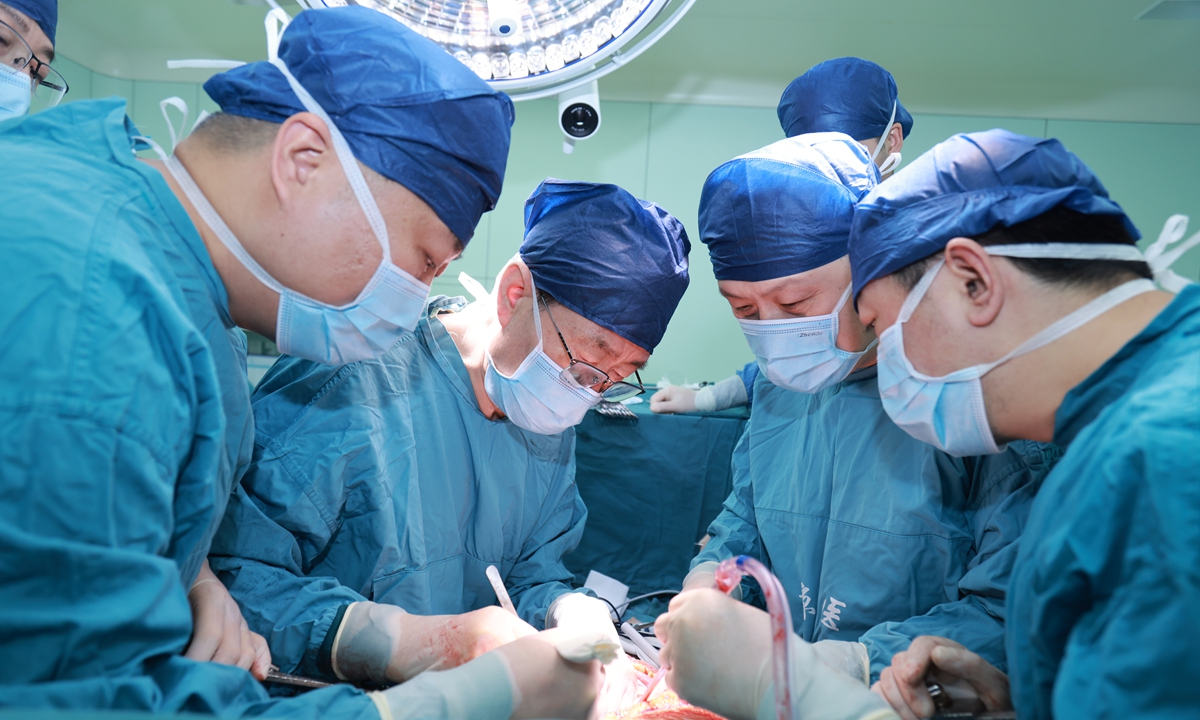
Doctors from the Xijing Hospital of Air Force Military Medical University perform the world's first gene-edited pig xenotransplantation surgery for whole liver transplantation in a brain-dead patient in Xi'an, Shaanxi Province on January 7, 2025. Photo: Courtesy of the Xijing Hospital of Air Force Military Medical University
China has successfully performed the world's first gene-edited pig xenotransplantation surgery for whole liver transplantation in a brain-dead patient, achieving the complete replacement of a human liver with a gene-edited pig liver, according to a statement the Xijing Hospital of Air Force Military Medical University sent to the Global Times on Thursday.
The surgery was conducted on Tuesday by the hospital, led by Dou Kefeng, an academician from the Chinese Academy of Sciences, along with more than 10 disciplinary expert teams from the entire hospital. This achievement follows the hospital's success last year, when it first used a gene-edited pig for auxiliary liver transplantation in a brain-dead patient.
This clinical study has been approved by the academic committee, medical ethics committee, organ transplantation committee and animal committee, and complies with international requirements for xenotransplantation, according to the statement.
Brain-dead patients often experience unstable physiological states, particularly in circulation. Ensuring the recipient's stability to undergo both liver resection and xenogeneic liver transplantation presents a significant technical challenge, Wang Lin, director of Hepatobiliary Surgery at the hospital, told the Global Times.
The anatomy and segmentation of pig livers differ significantly from those of human livers. Additionally, pigs are quadrupeds while humans are bipedal, resulting in completely different layouts and positions of the liver within the body. Positioning a pig liver appropriately within the human body while ensuring uninterrupted blood flow was a significant challenge encountered during the surgery, Wang said.
Wang added that liver is the core metabolic organ of the human body with complex functions. At present, there is no medical method to fully replicate liver function through mechanical assistance. This surgery, which entirely replaced the human liver with a pig liver, is an unprecedented endeavor fraught with unknowns and challenges.
The surgery involved multiple stages, including the harvesting of the donor pig's liver, resection of the patient's original liver and implantation of the new liver, as well as reconstruction of blood vessels, hemostasis and closure. The surgery took more than 10 hours to complete. More than 800 grams of six-gene edited pig liver was successfully implanted in situ into a patient, who had been certified as brain dead after the hospital's all-out rescue efforts and multiple evaluations.
After intraoperative opening of the blood flow to the transplanted porcine liver, the liver showed good perfusion and began to produce bile. As of now, the patient's circulation and other basic vital signs are stable, and liver function and several other indicators are gradually stabilizing, marking the surgery a success.
According to Dou, this surgery is the first attempt in the world to remove the recipient's own liver and replace it with a pig liver, observing the changes in transplanted liver function and the patient's vital signs.
From the current results, it appears that gene-edited pig livers may potentially replace human livers in the early stages after transplantation. The success of this research represents another breakthrough in the field of xenotransplantation and is a key step toward clinical application of xenogeneic liver transplantation, providing important theoretical basis and technical support for future clinical applications.
As to whether the subsequent application can be continued, it will require extensive exploration and further clinical research. There is still a long journey ahead, but this initial achievement is invaluable, Wang told the Global Times.
There are nearly 400 million patients with liver diseases and more than 7 million patients with liver cirrhosis in China. Additionally, each year, there are 300,000 to 500,000 new cases of liver failure. For liver failure, liver transplantation is the only effective cure. In reality, many people have lost their lives because they cannot wait for a human liver donor, read the statement.
Xenogeneic liver transplantation is not limited by the availability of donor livers, which could benefit more patients with end-stage liver disease and may potentially replace allogeneic liver transplantation in the future, experts said.




